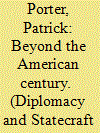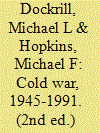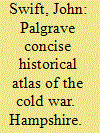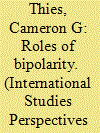|
|
|
Sort Order |
|
|
|
Items / Page
|
|
|
|
|
|
|
| Srl | Item |
| 1 |
ID:
108882


|
|
|
|
|
| Publication |
2011.
|
| Summary/Abstract |
As the United States became a world Power, journalist and intellectual Walter Lippmann feared that it would become its own worst enemy. During and after the Second World War, he tried to steer the country towards coherent statecraft, to define the national interest and the limits of power, and give geopolitical expression to the role of the United States as the core of an Atlantic strategic system. But in response to world war, the Truman Doctrine, and the Korean War, he became pessimistic about the country's ability to conduct strategy effectively. In the prophetic tradition, he believed that a fatal symbiosis between America's growing strength and domestic politics led it towards crisis. Though at times ahistorical, Lippmann's concept of strategy deserves attention for its dialogue between power and identity, for its questioning of "ends" as well as means, and for its focus on the danger of self-defeating behaviour.
|
|
|
|
|
|
|
|
|
|
|
|
|
|
|
|
| 2 |
ID:
031520


|
|
|
|
|
| Publication |
London, Hamish Hamilton, 1973.
|
| Description |
viii, 278p.: ill., mapsHbk
|
| Standard Number |
241015170
|
|
|
|
|
|
|
|
|
|
|
|
Copies: C:1/I:0,R:0,Q:0
Circulation
| Accession# | Call# | Current Location | Status | Policy | Location |
| 011901 | 943.087/MOR 011901 | Main | On Shelf | General | |
|
|
|
|
| 3 |
ID:
067720


|
|
|
|
|
| Edition |
2nd ed.
|
| Publication |
Hampshire, Palgrave Macmillan, 2006.
|
| Description |
xvi, 188p.Pbk
|
| Series |
Studies in European History
|
| Standard Number |
1403933383
|
|
|
|
|
|
|
|
|
|
|
|
Copies: C:1/I:0,R:0,Q:0
Circulation
| Accession# | Call# | Current Location | Status | Policy | Location |
| 050661 | 909.825/DOC 050661 | Main | On Shelf | General | |
|
|
|
|
| 4 |
ID:
155288


|
|
|
|
|
| Summary/Abstract |
The Truman Doctrine is seventy years old, which means it could easily be considered an artifact of history. In the age of Donald J. Trump, one might reasonably ask, what use is there for a doctrine that set forth the grand strategy of containment? Regardless of the Cold War, the doctrine’s essential pieces—applying a combination of political, economic, and military strength; building regional and bilateral alliances based on collective defense; cultivating existing liberal democracies and future liberal democratic regimes; containing totalitarianism and promoting its demise; and fostering an American-built-and-led liberal world order—are still being or should be used. At the present, critical time when national security threats issue from revisionist great powers, lesser-yet-still-hostile state and non-state actors, and WMDs and cutting-edge technologies in the hands of all these entities, it is important to understand not only the Truman Doctrine’s origins but also the reasons that the fundamental insights of this grand strategy should still inform U.S. foreign policy.
|
|
|
|
|
|
|
|
|
|
|
|
|
|
|
|
| 5 |
ID:
149433


|
|
|
|
|
| Summary/Abstract |
By analyzing Turkey’s relations with Great Britain and the US in a period of drastic change (1929–47), this article argues that the origins of the shift in the orientation of Turkish foreign policy from Pax Britannica to Pax Americana not only affected the perceptions and strategies of relevant powers, but also entailed a dynamic interactive process. It asserts that the transition featured aspects of significant change, as well as continuity for the region. It demonstrates that while attempting to bandwagon with the relatively stronger naval, military, and economic partner, Turkey also endeavored to pursue a more autonomous foreign policy at various stages of this transition.
|
|
|
|
|
|
|
|
|
|
|
|
|
|
|
|
| 6 |
ID:
050055


|
|
|
|
|
| Publication |
Hampshire, Palgrave Macmillan, 2003.
|
| Description |
vii, 120p.Pbk
|
| Standard Number |
0333994043
|
|
|
|
|
|
|
|
|
|
|
|
Copies: C:1/I:0,R:0,Q:0
Circulation
| Accession# | Call# | Current Location | Status | Policy | Location |
| 047463 | 909.8350223/SWI 047463 | Main | On Shelf | General | |
|
|
|
|
| 7 |
ID:
123138


|
|
|
|
|
| Publication |
2013.
|
| Summary/Abstract |
Since the end of the Cold War, scholars have debated the merits of the major theoretical traditions in international relations and foreign policy. Neorealism was criticized for failing to predict the end of bipolarity in material capabilities. Constructivism emerged during this time as a viable alternative explanation for the Cold War based on the role of ideas. This paper seeks to assess the impact of material and ideational factors on the origin, development, and end of the Cold War through an examination of the roles adopted by U.S. Presidents in their foreign policy doctrines. The paper finds that the origin of the Cold War was primarily ideational and was constituted by the "roles of bipolarity" adopted in the Truman Doctrine. During the Cold War, minor variations in these roles can be explained by shifts in material capabilities. The end of the Cold War was the result of changes in Soviet ideas, which were later confirmed by the collapse of the Soviet Union. After the end of bipolarity, we see the United States struggling to identify its proper foreign policy role.
|
|
|
|
|
|
|
|
|
|
|
|
|
|
|
|
| 8 |
ID:
123034


|
|
|
| 9 |
ID:
174170


|
|
|
|
|
| Summary/Abstract |
During the transitional period between the end of the Second World War and the beginning of the 1950s London and Ankara left behind the coolness that had crept into their relations as a result of Turkey’s neutrality during the war and reaffirmed their pre-war alliance. However, the strategic interests the two countries shared did not result in a closer political bilateral relationship. Moreover, before long the British government had succeeded by various ill-thought actions in causing the resentment of their Turkish ally. The respective attitudes of the British and the Turks towards each other were informed by the interplay between material interests and ideational factors against the backdrop of the perceived Soviet threat, Britain’s ebbing power and the rising power of the United States. This study narrates a brief but interesting chapter in the course of Turkish-British relations. It also offers interesting insights into the dynamics of great power/small state interaction.
|
|
|
|
|
|
|
|
|
|
|
|
|
|
|
|
| 10 |
ID:
192144


|
|
|
|
|
| Summary/Abstract |
US President Joe Biden’s foreign policy, as expressed in the 2022 National Security Strategy, represents a contemporary variation of the Truman Doctrine, the Marshall Plan and the post-Second World War programme of US global leadership. It frames great-power politics in the international arena and democratic revitalisation at home as part of a broad ideological confrontation between liberal-democratic capitalism and illiberal, authoritarian nationalism. It directs an economic-recovery plan inward to rebuild the US economy after the distortions it has been experiencing since 2008. And it promotes US leadership of the liberal-international order, albeit in a different geopolitical environment than prevailed in the post-war years. This strategy has been refined in the face of near disaster and revived by the Russian invasion of Ukraine in February 2022.
|
|
|
|
|
|
|
|
|
|
|
|
|
|
|
|
|
|
|
|
|